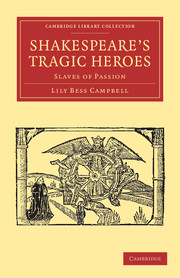CHAPTER FIFTEEN
Macbeth: A Study in Fear.
Published online by Cambridge University Press: 07 September 2010
Summary
It is usual to refer to Macbeth as a tragedy of ambition, and with a certain justification, for ambition does act as a determining passion in the play. This passion The French Academie described as “an unreasonable desire to enjoy honours, estates, and great places”. Such is the passion which moves Macbeth and Lady Macbeth to the murder of Duncan, but it is not ambition that is anatomized in the tragedy of Macbeth.
The play is really a study in fear. And since fear is but one of a pair of passions, Shakespeare, according to his habit, paints the passion studied against the background of its opposite. Just as Romeo and Juliet sounds its love-hate theme at the beginning, as Hamlet stresses the joy-grief pair of passions, as Othello develops the love-hatred of jealousy, so Macbeth develops the study of fear against a background of its opposite.
The pair of passions here studied, then, is a pair that were variously named during the English Renaissance. Wylkinson's Aristotle called them “fear and hardines”; Holland's Plutarch named them “Cowardice and rash Audacitie”. The French Academie entitled the chapter dealing with them “Of Timorousnesse, Feare, and Cowardlinesse, and of Rashnesse”. Bryskett called them fury and fear. But however they were named, they are the passions which represent the excess and the defect of the virtuous mean which was known generally as fortitude or courage or strength.
- Type
- Chapter
- Information
- Shakespeare's Tragic HeroesSlaves of Passion, pp. 208 - 240Publisher: Cambridge University PressPrint publication year: 2009First published in: 1930



